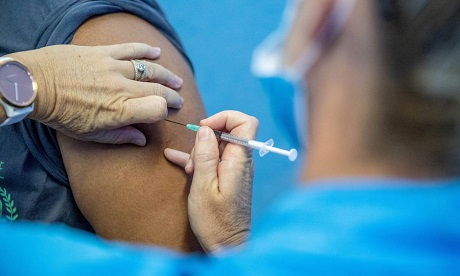COVID-19 vaccination rates among Māori are low. Changing this reality is challenging healthcare providers.
Although they are making inroads into the poor COVID-19 vaccination rates, health statistics show the low uptake is part of a difficult yet familiar reality.
At present, for every one non-Māori or Pacific person who has received their first dose of the vaccine in New Zealand, just 0.6 Māori have received theirs.
The problem is the healthcare system delivering the vaccine rollout is racist. That’s the opinion of Māori health professionals working in the system and the Associate Minister of Health.
Systemic change and mobilisation is needed urgently, they say.
One issue is that Māori have different health needs from Pakeha, with last September’s New Zealand Medical Journal noting Māori are 50 percent more likely to die from Covid-19.
Dr Rawiri Jansen – who quit the Government’s immunisation advisory group over concerns his voice was not being heard – says there is evidence that Māori aged 40 have similar health risks as Pakeha aged 65.
For equity to be achieved in the roll-out, he wants Māori and Pacific communities to be given access to the vaccine at a younger age.
“I’m disappointed in the Ministry of Health and their inability to achieve what they promised in the beginning which was equity in the vaccination programme.
“It is consistent with a health system which consistently, persistently, under-serves Māori. And we know that racism is a feature of that system.”
A big problem is contacting Māori which has been more difficult than with Pakeha, Jansen says.
“Maori and Pacific people have found it much harder to engage with text messages to tell them to go to a booking app, so that hasn’t worked well for us.”
Henare says the low COVID-19 vaccination uptake among Māori is not for lack of trying.
“I traveled the country to continue to promote the vaccine amongst our people,” he says.
“For whatever reason, our people didn’t come forward to get the vaccine.”
Jansen says he agrees comments made by Prof Papaarangi Reid last week that the unfolding situation is a breach of the Treaty.
His sentiments are echoed by Mr John Mutu-Grigg, chair of the Royal Australasian College of Surgeons’ Māori health advisory group.
Jansen, Mutu-Grigg and Henare’s concerns come at the same time as three Māori women are reporting improved health outcomes for Māori due to Māori-focused hard work.
Mata Cherrington, who leads Southland’s Awarua Whānau Services, an iwi health provider says at a recent three-day clinic, she and her team of three vaccinators helped 900 people get immunised – double the number the Southern DHB predicted.
While appreciative of the of the health board and Ministry of Health’s support, Cherrington says they’re far removed from the reality of what is actually happening on the front lines.
Also pushing Southland Māori to take up the immunisation challenge is Tracey Wright-Tawha – chief executive of Southland-based Ngā Kete Mātauranga Pounamu Charitable Trust. She is setting up clinics in remote areas to ensure vaccines are available to as much of the southern rural community as possible.
In Northland, another Māori woman, Dr Maxine Ronald, is making progress with vaccination uptake. However, systematic change from the top is needed to improve Māori health outcomes, she says.
Source
- Stuff
- Otago Daily Times
- Image: Stuff
